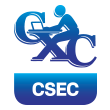For candidates who have sat our examinations, CXC® represents a singular dreaded word, exam. For employers and parents, CXC is about certification, mainly CSEC® or CAPE®. Most Caribbean people see CXC largely as an examining body which issues certification that has become increasingly recognized worldwide.
But, is CXC really only about exams and certification? As an examinations board, our primary function is the conduct of assessments in education on the basis of establishing agreed standards. To gain currency, these standards must be internationally acceptable and recognized worldwide.
The syllabi which we develop establish the rubrics for the various subjects and outline the parameters of what is to be covered. As a regional organization which serves 19 countries of the English and Dutch-speaking Caribbean, this process of syllabus development is a very intricate one that must draw on expertise from across that regional footprint, taking into account national nuances and incorporating practices and standards from the national jurisdictions. But above all of this, the process creates and builds a regional framework that forms the basis for a real harmonization of knowledge and standards in the Caribbean.
For almost 35 years, CXC has been doing this quietly and successfully. In a new thrust, we are now seeking to move beyond assessment of learning to deepen assessment for learning. The model of school-based assessments (SBAs) which CXC has had in place over these decades is now being actively considered and implemented by other international boards who now recognize its value. We are poised to move our SBAs to a higher level by making them more practical and using them as a tool for demonstrating real-world competencies. We are moving also to improve the quality of our examinations by utilizing stronger international benchmarking and more robust psychometrics.
We recognize that we can play a significant role in helping to drive performance improvement in a number of ways:
• The interactive learning portal – Notesmaster (www.notesmaster.com) – supplies study notes, simulations, quizzes and animations that help teachers and students alike to make learning more dynamic.
• Facilitating stronger orientation for teachers in the utilization of the syllabus and providing guidance on better instruction emanating from student performance in the exams. Work is ongoing for UWI Open Campus to offer this training in the teaching of every subject we offer at all levels.
• Disseminating more comprehensive reports, statistics and data intelligence to ministries of education and schools that wil help them in developing more targeted interventions for students (particularly those at risk or needing stronger instruction intervention).
In summary, this new thrust is not about more testing but better rationalization of testing, there is an American folk adage which advises “you can’t make a pig fatter by weighing it more often” but we certainly can use those weight measurements to feed it better.














Is it possible to implement a program on this website to better help students to properly choose their subject areas and to allocate the subjects to a specific career field/choice?